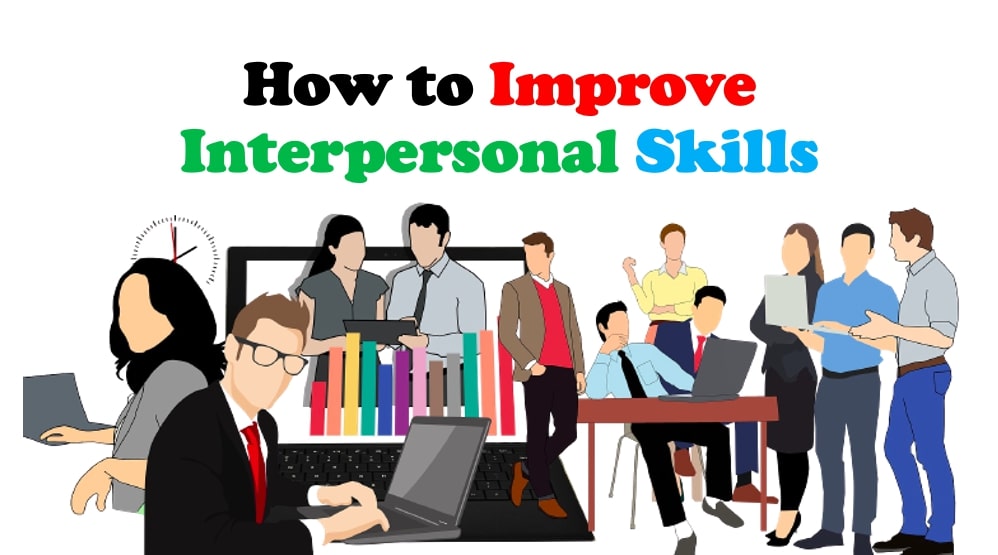Interpersonal skills enable people to communicate effectively, interact, and build relationships. These skills are important in all areas of life. However, they are particularly relevant in the workplace, where they can help you to work effectively with colleagues, manage teams, and build positive relationships with clients and customers.
There are different strategies that social scientists and corporate trainers apply to improve interpersonal skills.
See also: 7 Ways to Improve Your Interpersonal Skills.
Quick Links
What are Interpersonal Skills
Interpersonal skills are the abilities one needs to develop to communicate with others, build and maintain healthy relationships and interact effectively.
They are skills that enable one to work effectively with others and help them personally. They can be classified as either active or passive, depending on the individual’s activity.
Active Interpersonal Skills
These are the skills that are used to make a difference in your own life. They include things like assertiveness, empathy, and self-control.
Passive Interpersonal Skills
These skills are used to make a difference in other people’s lives. They include persuasion, negotiation, and understanding others’ perspectives.
The 10 Interpersonal Skills That Define Your Career Success
Communication skills: The ability to clearly and effectively communicate your ideas, thoughts, and feelings to others is essential for career success.
Emotional intelligence: The ability to understand and manage your own emotions, and to recognize and respond appropriately to the emotions of others, is crucial for building positive relationships and navigating complex situations.
Leadership skills: The ability to inspire, motivate, and guide others towards a common goal is essential for success in management and leadership roles.
Negotiation skills: The ability to persuade and reach mutually beneficial agreements with others is essential for success in business and in many other fields.
Teamwork skills: The ability to work effectively with others as part of a team is crucial for success in many roles and industries.
Conflict resolution skills: The ability to identify and resolve conflicts in a positive and constructive way is essential for maintaining positive relationships and creating a productive work environment.
Adaptability: The ability to adapt to changing circumstances and learn new skills is essential for success in a rapidly changing world.
Time management skills: The ability to prioritize tasks, manage your time effectively, and meet deadlines is essential for success in any role.
Creativity: The ability to think creatively and come up with new and innovative ideas can be a valuable asset in any field.
Empathy: The ability to understand and relate to the feelings and experiences of others is essential for building positive relationships and providing excellent customer service.
Importance of Interpersonal Skills
Having strong interpersonal skills is essential in the business world for several reasons:
Improved communication: Good interpersonal skills allow you to communicate effectively with colleagues, clients, and customers, which is crucial for building and maintaining positive relationships and achieving business success.
Enhanced teamwork: Strong interpersonal skills can help you work effectively with others as part of a team, which is vital for achieving common goals and delivering successful projects.
Enhanced leadership: Interpersonal skills such as emotional intelligence, conflict resolution, and negotiation can help you inspire, motivate, and guide others toward a common goal, which is essential for effective leadership.
Improved customer service: Good interpersonal skills can help you build positive relationships with clients and customers, which is crucial for delivering excellent customer service and retaining business.
Increased productivity: Interpersonal skills can help you build a positive work environment, leading to increased productivity and success for both the individual and the organization.
Tips for Building and Maintaining Positive Relationships
Be reliable. and People will be more likely to trust and respect you if they know they can count on you to follow through on your commitments.
Communicate openly and honestly. Be straightforward and transparent in your communication, and avbeing misleadingague or misleading.
Listen actively. Show that you are interested in what others have to say by giving them your full attention and trying to understand their perspective.
Show appreciation and gratitude. Let others know yoentry exportcontributions by expressing your thanks and appreciation.
Practice empathy. Try to see things from others’ viewpoints and show that you understand and care about their feelings and experiences.
Be respectful. Treat others with kindness and respect, even if you disagree with them.
Offer support and help. Be willing to lend a hand and theytfeedrs when they need it.
Be open to feedback. Be willing t listen to others’ suggestions and critiques, and consider their ideas and opinions.
Keep your promises. Do what you say you will do, and follow through on your commitments.
Resolve conflicts constructively. If a disagreement or conflict arises, try to find a way to resolve it positively and constructively.
Recommended Sentences to Improve Interpersonal skills
We all know that good interpersonal skills are crucial for success. It is the ability to communicate effectively with other people and build relationships. These ten lines will help you improve your interpersonal skills:
- I am sorry
- Thank you for trusting me with this responsibility
- I appreciate your time today
- What do you think about my idea?
- I am listening to what you are saying
- What is on your mind?
- How can I help you?
- What would make the situation better for you?
- I want to understand more about what is happening in your life right now.
- I understand how you feel.
- What can I do to help?
- I apologize for any inconvenience I may have caused.
- Thank you for your input/feedback.
- Can you tell me more about that?
- I appreciate your perspective.
- I see what you mean.
- I’m open to hearing your ideas.
- I apologize if I came across as [rude/insensitive/etc.]. That was not my intention.
- I value your thoughts on this matter.
Twenty Tips to Improve Your Interpersonal Skills
Practice active listening. Give the person you are communicating with your full attention and try to understand their perspective.
Use open-ended questions. Ask questions that cannot be answered with a yes or no, to encourage the other person to share more information.
Be present at the moment. Avoid distractions and fully engage in the conversation.
Use appropriate body language. Make eye contact, nod, and use facial expressions to show that you are engaged in the conversation.
Use appropriate tone and volume. Use a friendly and respectful tone, and adjust your volume to be appropriate for the situation.
Practice good eye contact. Make eye contact with the person you are talking to, but avoid staring or appearing aggressive.
Avoid interrupting. Allow the other person to finish speaking before interrupting or speaking over them.
Be open and honest. Be transparent and genuine in your communication, and avoid being vague or misleading.
Use positive language. Use language that is constructive and positive rather than negative or critical.
Show empathy. Try understanding the other person’s perspective and showing that you care about their feelings.
Practice patience. Take your time and allow the conversation to unfold naturally.
Stay calm. Even in difficult situations, stay composed and avoid getting overly emotional.
Be open to feedback. Be willing to listen to others’ suggestions and critiques, and consider their ideas and opinions.
Practice clear and concise communication. Be direct and to the point, and avoid jargon or technical language that others may not understand.
Use appropriate humor. Humor can be a great way to build rapport and strengthen relationships, but be aware of the context and the other person’s sense of humor.
Show gratitude and appreciation. Let others know you value their contributions by expressing your thanks and appreciation.
Use nonverbal communication. Use facial expressions, gestures, and body language to convey your meaning and emotions.
Practice active listening. Repeat what you have heard to confirm your understanding and show that you are paying attention.
Be a good listener. Show that you are interested in what others have to say by giving them your full attention and trying to understand their perspective.
Seek feedback. Ask for feedback on your interpersonal skills and be open to learning and improving.
Bottom Line
Interpersonal skills are the skills that you need to have to interact with others. These skills include listening, asking questions, and making eye contact.
Some people believe interpersonal skills are not required in the workplace because they believe it is too much work and time-consuming. Some people also think it is unnecessary to have these skills because they are introverts and don’t enjoy interacting with others.
However, interpersonal skills are important in the workplace because they allow you to better connect with your colleagues and clients. They help you build relationships which can lead to more opportunities at work or in your personal life.
Sharing is Caring

























